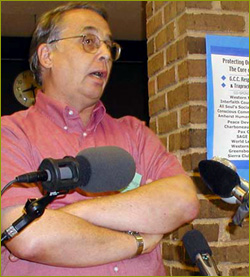
Part 1 2 3 4 5
Parts of the Patriot Act had broad support - for example, provisions updating wiretap regulations for the cell phone age. But key sections of the law dismantled limits on the monitoring of citizens - limits that Congress created in the 1970s in response to widespread abuses.
 | Chris Pyle helped reveal the Army's vast domestic spying program in 1970.
(Photo by Charles Jenks
Courtesy Traprock Peace Center) |
Chris Pyle teaches law at Mount Holyoke College in Massachusetts. In 1968 he was a young captain, preparing to teach at the Army Intelligence School in Maryland. Another officer gave Pyle a tour of the Army's domestic intelligence headquarters.
"We got our passes and wound our way down through the maze of rooms inside of it," says Pyle.
In one room, he saw a row of Teletype machines chattering away as reports came in from 1,500 Army intelligence agents around the country.
"These were the agents who normally did security clearances for the Army, but their secondary duty was to monitor dissent."
As his tour continued, Pyle was astonished to find Army investigators filling file cabinets with dossiers on civil rights activists. They were clipping newspaper stories about people giving anti-war speeches, even monitoring meetings at churches.
"It was very clear to me," says Pyle, "that we had just witnessed the essential apparatus of a police state. And it wasn't that these people were trying to create a police state. They were very nice, decent human beings. ... But they were creating a reporting apparatus that would cover millions of Americans engaged in entirely lawful political activity."
Pyle later wrote award-winning articles exposing the Army's domestic spying program. Within a few years, congressional investigations revealed more shocking abuses. Under Presidents Johnson and Nixon, FBI Director J. Edgar Hoover had ordered systematic spying on civil rights organizations. He also used blackmail and smear campaigns to undermine the groups and their leaders.
But, as Pyle points out, Hoover's agency often relied on nothing more than shoe leather and manila folders.
"What I investigated back then was bush league and amateur hour," says Pyle. "This has changed radically because of the power of computers and telecommunications."
Continue to Part 5
|



